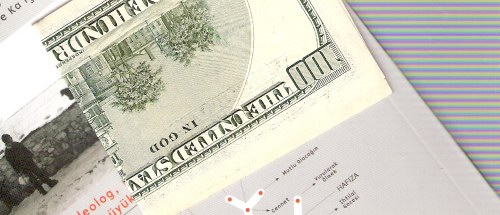  All this is due to the clumsiness of barter. This fact has been explained so often that no further emphasis would seem necessary, were it not for the evidence in current history of a widespread belief that we might somehow bring about better human relationships if we could first abolish money. The inconveniences of barter -- the direct exchange of goods for goods -- are illustrated in Lieutenant Cameron's account of his difficulties in buying a boat in Africa: "Syde's agent wished to be paid in ivory, of which I had none; but I found that Mohammed Ibn Salib had ivory and wanted cloth. Still, as I had no cloth, this did not assist me greatly until I heard that Mohammed Ibn Gharib had cloth and wanted wire. This I fortunately possessed. So I gave Ibn Gharib the requisite amount of wire; whereupon he handed over cloth to Ibn Salib, who in his turn gave Syde's agent the wished-for ivory. Then he allowed me to have the boat." This case exemplifies the main inconvenience of barter, namely, that of finding a man who not only wants what you have to sell, but has for sale what you want to buy.

 Among thousands of highly specialized workers included in our latest census, we find makers of windmills, coffins, lead pipe, calcium lights, and artificial limbs. Suppose each of these craftsmen were paid, as laborers were once paid, in shares of the products of his own labor. Imagine any one of them carrying about a supply of his products and trying to use them in his daily round of marketing with the butcher, the baker, and the candlestick-maker. Without a medium of exchange, a man could make shoes and exchange them directly with a man who made wheelbarrows, though even in this case the indivisibility of the units would cause trouble; but a man who made only eyelets could not directly satisfy many of his wants on a barter basis. Indeed, in a barter society, most of the exchanges that are now easily effected by money would be hopelessly cumbersome. The waste involved in finding the double coincidence of wants and in exactly balancing accounts, and the very labor involved in transporting commodities and in making the exchanges, would prevent anything remotely approaching either the variety or the volume of present-day trade.
 Textbooks on money have usually pictured the difficulties of the imaginary hatter, in the imaginary days before there was any medium of exchange, who wanted to buy a house, but who sought in vain for anybody who wanted as many hats as the house was worth. To-day the difficulty of carrying on internal trade without a medium of exchange would be even greater, because most of those who wish to buy goods have no goods whatever to offer as payment. In the shoe factory, for example, there is a bookkeeper, and a sales manager, and a cutter, and a finisher, and a night-watchman; and no one of them produces anything that he can offer to the butcher in ex- change for a chop. The butcher does not want their products or their services, any more than he wants the poet's masterpiece. Much less does he desire the admirable statement which the accountant has drawn up for the furrier across the way. Neither does the accountant want his pay in furs, nor the jeweler's office boy his wages in wedding rings. The only way to satisfy everybody is by means of an interposed something which everybody knows that everybody else will accept in exchange for whatever goods and services they have to sell.


|